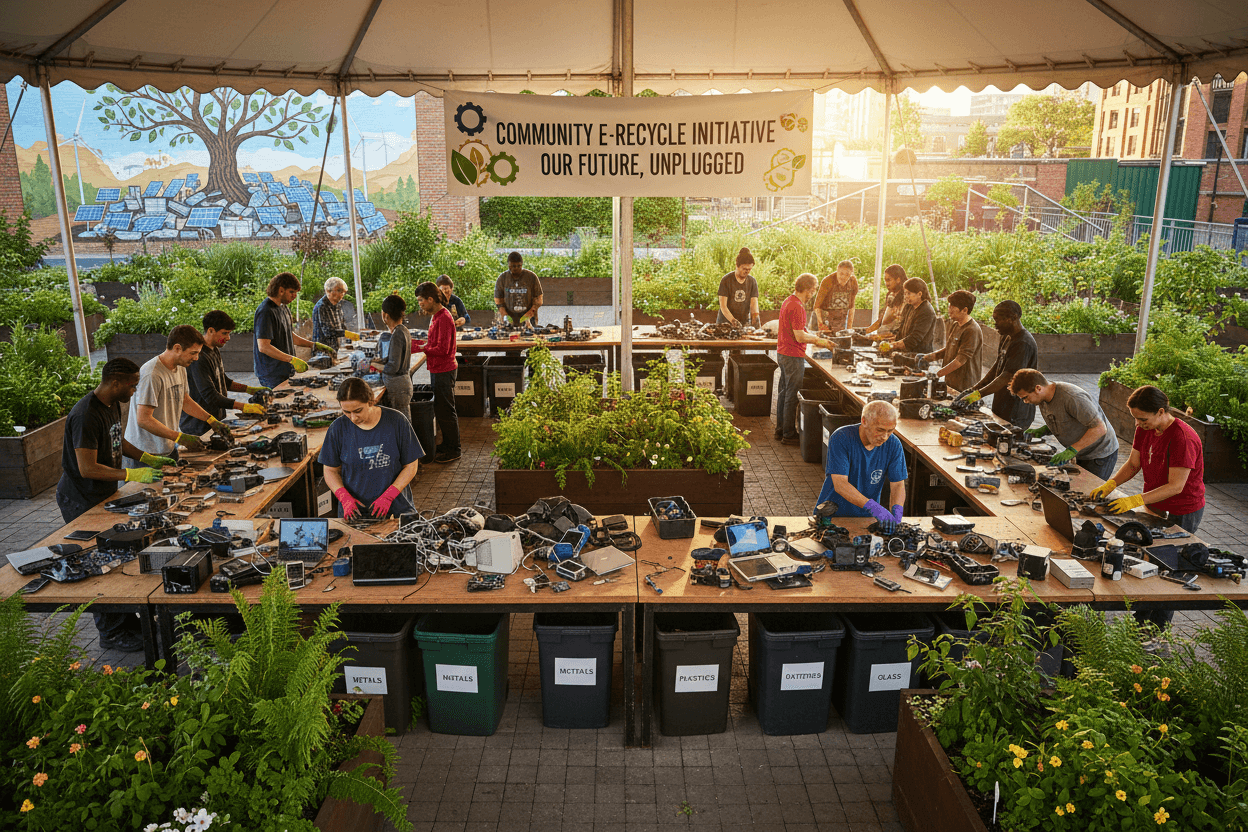Only Social Action Can Solve Rising E-Waste

Introduction
The world is generating more E-waste annually. Old cellphones, damaged laptops, unused chargers, and defective home appliances litter landfills. Toxic chemicals from these devices reach into soil and water. In essence, this problem affects both the environment and human health. Governments and corporations have joined the management of wastes, but rules alone don't solve everything. People themselves must take responsibility. Social action, therefore, becomes the real answer. When communities rally together, they can minimize sustainable wastes, propagate recycling, and preserve the planet. This blog teaches why social action can be the sole solution to address the rise in E-waste levels and how everyone can contribute to that process.
Understanding the Scale of Rising E-Waste
E-waste is the fastest-growing waste stream in the world, with millions of devices being discarded every year. Because new technology is arriving much faster compared to earlier times, people tend to change phones and laptops very fast. This habit is very well creating E-waste and piling pressure on the environment. These toxic elements include lead, mercury, and plastics that do not degrade easily. They keep polluting the earth for many years. Without social action, this problem will keep worsening. People need to understand the real meaning of sustainable waste. Public awareness might change habits. Society needs to learn responsible device use and its proper disposal method to reduce further damages in the future.
Why Individual Behavior Matters
Social action begins at home. Each person produces E-waste. Individual choices determine how much of that goes to landfills. It is by deciding to repair devices instead of purchasing that the users reduce sustainable waste. Donating functioning mobiles or even selling them for refurbishment is another way in which one supports the circular economy. Simple separation of E-waste and giving it to authorized recyclers, avoiding illegitimate dumping of E-waste-all contribute towards saving the environment. The change first comes with awareness. Communities act when its people do. The world will be able to reduce E-wastes only when responsible consumption habits are followed.
Community Involvement Strengthens Sustainable Practices
Communities play a critical role in E-waste management. Local groups can organize campaigns, set up collection drives, and encourage people to recycle old devices. Schools can teach students about sustainable waste and the effects of irresponsible dumping. Societies and residential communities can identify drop-off points for old electronics. People feel responsible when communities work together. Social action becomes a habit. These acts collectively diminish the burden on government machinery and recycling companies. It also leads to a kind of unity. Together, communities can build a strong culture of sustainability.
The Role of NGOs and Environmental Groups
NGOs and environmental groups actively participate in overcoming E-waste. They help people get acquainted with safe methods of waste disposal. Many NGOs organize collection campaigns and assist urban recycling programs. They operate in rural areas where people have very little awareness. These groups advocate for strict policies but also inspire social involvement. They demonstrate how small steps can make a huge difference. For instance, NGOs facilitate the establishment of repair cafes, a place where people repair old electronics free of cost or at very low prices. Such initiatives lessen sustainable waste and develop a sense of community responsibility.
Government Policies require public support.
Governments make rules regarding the management of E-waste, but laws work only when the people follow them. No policy can succeed without the support of the public. The government can establish recycling centers and impose penalties for illegal dumping, yet people must avail themselves of the services. Social action turns policies into concrete, material actions. When citizens demand eco-friendly products, companies comply. When public pressure mounts, manufacturers shift to safer practices. Laws, when supported by social action, result in deeper impact. This partnership between the authorities and society is the key to arresting growing E-waste.
Manufacturers and Their Responsibility
Electronics manufacturers also have a big role. They make devices and are supposed to manage their impact. Many companies now offer take-back programs where customers return old gadgets. But these programs are useful only when people participate in them. Social action encourages users to return devices instead of throwing them away. Manufacturers should design products with longer life, easy repair, and recyclable materials. When customers demand sustainable waste solutions, companies are compelled to innovate. Social pressure pushes brands to accountability. Combined efforts bring in substantial E-waste reduction.
Recycling and Refurbishing are Important
Recycling is one of the best ways to manage E-waste. Proper recycling involves separating harmful materials and recovering valuable metals. This reduces the incidence of pollution and guards the natural resources. Refurbishment increases the life of electronic gadgets. Instead of buying new gadgets, people can use repaired or second-hand gadgets. This diminishes the need to manufacture new products, lowering carbon emissions. Social action is needed to facilitate recycling programs. People need to know how to hand over waste to only the certified recyclers. With collective effort, recycling gets more efficient and wider.
Education and Awareness Can Change the Future
Education is important for minimizing E-waste. Schools should include environmental lessons in their curriculum. The children need to know the value of waste management and sustainability. While growing up, they continue with good habits. Parents, teachers, and society should assist in this learning process. Public campaigns, social media awareness, and workshops will ensure that adults understand the dangers of careless dumping. Knowledge creates action; when people know the impact, they take action to protect the environment. Education provides the roots for social action.
Digital Responsibility in the Modern World
While technology grows, E-waste does too. Digital responsibility pertains to acting wisely with devices. People should avoid buying gadgets they do not need. Choosing energy-efficient devices, repairing old products, and recycling helps reduce sustainable waste. Business also needs to follow digital responsibility, properly managing office equipment. They should donate unused devices to schools, NGOs, or low-income families. Responsible use of technology is considered social action; it supports a sustainable environment.
The Economic Benefits of Social Action
Social action adds value to the economy. Recycling E-waste provides jobs. Repairing and refurbishing electronics spawn new business models. In such a situation, small industries and technicians benefit. When people practice responsible behavior, recycling services will be in demand. This will support green innovation. Social action also reduces the financial burden of waste management on governments. A cleaner environment ensures public health and reduces medical expenses. Aggregately, these benefits make E-waste management not only an environmental need but also an economic advantage.
Joint Responsibility for a Sustainable Future
The fight against rising E-waste is hence everybody's responsibility: governments, companies, NGOs, communities, and individuals. No single group can defeat the menace. Social action unites people. It encourages cooperation, awareness, and long-term commitment. Every small step adds up to a big change. Proper disposal, recycling, and responsible consumption help protect Earth. If society acts en bloc, then there can be a sustainable and safe future for all.
Conclusion
The rising E-waste is a challenge, yet not impossible to solve. Of course, laws and technologies are there, but they cannot work without people. Social action is the base of effective E-waste management. Individual and community actions, along with organizations, collectively create an impact. Repairing, recycling, and donating devices-all these simple habits reduce sustainable waste. A responsible society protects the planet. Today's choices are going to decide the future. If everybody takes small steps, the world can definitely manage E-waste and rebuild a cleaner atmosphere. Social action is the only real solution.
FAQs
Q.1. Why is social action important for reducing E-waste?
Because real change comes only with people acting responsibly and supporting recycling.
Q.2. How can people reduce E-waste?
By fixing gadgets, correctly recycling them, and avoiding upgrades that aren't needed.
Q.3. What is sustainable waste?
It is waste managed in an environmentally protective way and compatible with recycling.
Q.4. Why is E-waste dangerous?
It contains toxic materials that harm soil, water, air, and human health.
Q.5. How do communities assist in reducing E-waste?
They run collection drives, awareness campaigns, and promote responsible disposal.





